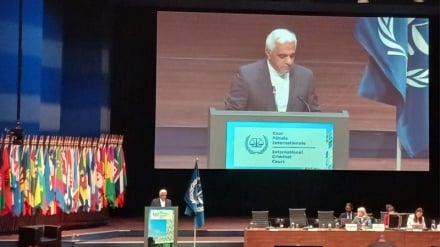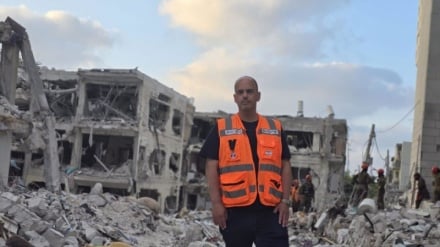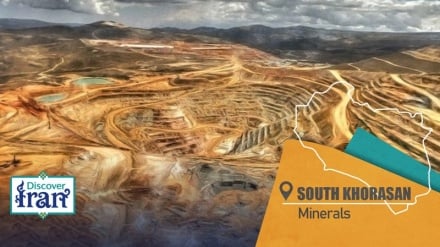Iran, EU relations in post-JCPOA era (3)
The commonalties and joint interests of Islamic Republic of Iran and the European Union is more than the challenges between them. Iran’s strategic status and important regional position; possession of huge sources of energy; and Iran’s huge market, are some of the highly important factors which can make countries, including the European Union member states interested in establishment of relations with Iran.
Iran’s geographical position in Middle East is unique. Islamic Republic of Iran maintains a strategic status in the region. Iran’s strategic status in all political, economic, commercial, scientific, and cultural realms has been attested by global strategists.
Given these parameters, Islamic Republic of Iran can play a key role in maintenance of regional peace and security. Iran, by reliance on its regional position, is a key element in any security system across the Persian Gulf region. Iran’s key position sets the stage for cooperation and interaction between Iran and European Union member states.
Presence of Iran as a stable country in an unstable region shows Iran’s strategic role and can be a highly important factor in the regional and security-related interactions between Islamic Republic of Iran and the European Union member states. This is while the majorities of regional Arab states are embroiled in land and historical disputes with each other and can never shape an efficient security system in the region.
Cooperation within the framework of intra-regional relations is one of the other aspects of cooperation between Iran and European countries. Consultations and exchange of views about Afghanistan and Iraq; establishment of stability and security in Persian Gulf and Central Asia; and the status quo in Middle
East can be some of the highly important grounds for cooperation between Iran and European Union member states. Given Iran’s strategic position in the region; regional interactions can pave the way for cooperation and consultation of Iran with European countries, and form a closer bond between the two parties. Islamic Republic of Iran considers bolster of economic cooperation with the European Union as a contributor to regional stability, and in line with Islamic Iran and other regional countries’ goals and interests.
In the past three decades, the European Parliament, throughout its resolutions, has discussed and intentionally criticized a wide range of Iran’s issues of importance. Nonetheless, a number of factions in the European Parliament are interested in negotiations and parliamentary meetings with Islamic Republic of Iran’s lawmakers. In the previous years, a number of parliamentary groups from Iran’s Majlis and/or the European Parliament met and conferred with their counterparts in Tehran, Brussels, or Strasburg.
Given the fresh atmosphere shaped after the conclusion of the Joint Comprehensive Plan of Action (JCPOA) between Iran and 5+1 Group member states, the said trend can be resumed with an appropriate definition. The presence of a parliamentary delegation, or an Iran-European Parliament relations group, in an official manner, paves the ground for expansion of parliamentary ties, and exchange of views between the two parties’ lawmakers. Through such a parliamentary delegation, Iranian and European lawmakers can discuss topics of mutual interest and can lay the ground for development of mutual cooperation.
The European Union as the largest global commercial and economic bloc, which is highly coordinated, particularly in its foreign trade relations, supports the formation of an efficient convergence process in different parts of the world. In the meantime, the European Union member states support the establishment of regional trade blocs. In the view of European Union, expansion of regional cooperation is of paramount importance in resolution of disputes and tensions among the countries, across these regions.
The European Union member states believe that via regulation of relations with regional blocs and economic unions; these member states can regulate their relations with countries in these regions in a more appropriate manner; and instead of holding bilateral talks with each of these countries, these member states can negotiate and establish cooperation agreements with a union of these countries.
Thus, the European Union supports expansion of regional cooperation within the framework of regional convergence, considering this as a highly useful approach for development of its relations with global trade blocs. On this basis, there is an existing potential for holding joint annual meetings between the Economic Cooperation Organization (ECO) and the European Union member states. Islamic Republic of Iran is one of the key, founding members of ECO.
Given the strategic and highly important position of the Islamic Republic of Iran, this country can attain an especial status in regulation of its relations with the European Union via interaction and cooperation with the Persian Gulf and Caspian Sea littoral states; Central Asian countries; Economic Cooperation Organization (ECO) and Oil Producing Exporting Countries (OPEC) member states.
Iran’s huge oil and natural gas reserves have captured the attention of major European companies. Due to several problems projects face in transference of energy to Europe; and Europe’s inclination to lower its dependence on Russia; Iran can turn into one of the main providers of the European countries that need energy resources. The vital importance of oil for European countries has led the European Union member states to maintain an especial outlook toward oil-rich countries or regions.
Islamic Republic of Iran based on its 20-Year Outlook Plan; which mainly aims for economic development; and as a country which has a unique status in the energy sector, believes that in the light of energy diplomacy it can benefit from the positive outcomes of investments and participation of European countries and companies. Thus, energy diplomacy can shape fresh ties between Iran and other players of global economic and political order; especially with the European Union member states.
Iran and Europe maintain highly appropriate capacities for cooperation. Today, the Islamic Republic of Iran and European Union, based on a new model on talks, can define their relations in a win-win framework. If the atmosphere for appropriate dialog is shaped between Iran and European Union, the challenges between the two parties could turn into subjects for cooperation.
Thus, in order to begin a fresh cooperation and a constructive interaction, there is need for a common understanding, which will seemingly be assisted by the Joint Comprehensive Plan of Action. It seems that the European Union member states, upon the assessment of their relations in the past decade, are interested in regulation of fresh ties and expansion of relations with Iran in the light of the of the established positive atmosphere.
The cooperation of Islamic Republic of Iran and the European Union leads to stability and calm in the geopolitical and volatile region of Middle East, and thus expansion of this mutual cooperation can be highly beneficial and effective for the international community.
MR/SS


